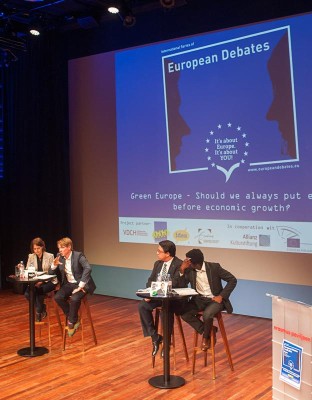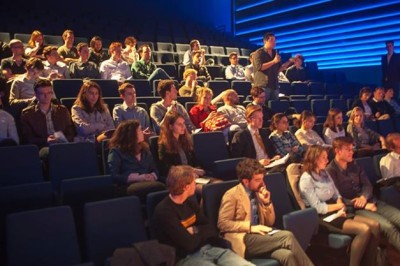Ecology, economy, or maybe employment? European Debates in Rotterdam
The Erasmus Debating Society (EDS) of Rotterdam hosted a public debate on the question: “Should we always put ecology before economic growth?” on the 14th of May, a week before the Netherlands will go to the voting booths for the European Parliament elections. Partij van de Arbeid (Labour) candidate for the European Parliament Gerard Oosterwijk and EDS member Sezen de Bruijn presented the proposition case, while the d’66 (Liberal) candidate Paul Breitbarth and EDS member Daniel Fayoyin argued for the opposition side. The newly built Paviljoen Theatre on the Erasmus campus was filled with 52 enthusiastic audience members. Marike Abrahamse, chair of EDS, welcomed them to the debate that was part of the 25-year anniversary of the debating society. Anna Livia Mattes from Bürger Europas then introduced the interactive debate format. A secret vote was cast to determine the which side the audience supported initially. Then the debate began.
The proposition argued on the one hand that without a focus on ecology, all our efforts were futile, as we would very soon not have enough resources, clean air, water and land to enjoy the benefits we obtain from economic growth. On the other hand a focus on sustainable methods and renewable energy would also bring many gains, such as job growth through this new economy, less dependence on mineral resources and the countries that supply them, and a chance to prevent a very abrupt change. The opposition side, on the other hand, argued that while sustainability and ecology very often did bring economic benefits, sometimes a focus on avoiding pollution at all costs would lead to harsh economic consequences. As the economy ultimately guarantees that we can seek those things that benefit our society the most, and helps us fix any environmental problems, we should sometimes choose economic growth over ecology.
The audience then asked questions of the speakers, which gave them an opportunity to clarify some of their claims. Both proposition and opposition, for example, had no intention to set up new nuclear power plants. The proposition side clarified that while they would put ecology above economic growth, they would choose employment opportunities over ecology if put to the question, but not all economic growth would bring more employment opportunities. The opposition side saw the EU as an important actor to bring together those that can solve environmental issues, for example by stimulating a connection of the full European energy grid, but argued that the EU should focus on enabling market solutions. What should be done should be decided on a case by case basis. The proposition side argued that the EU should step in and limit the choices of market forces in more blanket rules so that they would be better able to focus on the best solutions available.
The proposition and opposition speakers all had one final chance to argue their case, before the audience was asked for a second vote. The majority, 25, voted for the opposition, against 14 for the proposition. The winners of the debate, then, were the proposition, because they had two more votes on their side than before the debate, while the opposition received an equal number of votes in both cases. Marike Abrahamse thanked the audience and speakers, she invited everyone to attend the EDS anniversary party on the next night, and encouraged everybody to go and vote next Wednesday.
Pictures of the debate are now available online. The European Debates are a follow-up to the project Klartext Europa that started a series of public debates between university students and politicians on issues of European Politics across German-speaking countries in 2013. The debates allow politicians to not only debate in front of a student audience, but to debate together with talented student speakers and engage with questions from the audience in a style inspired by the Oxford Chamber debates. Find out more about the format on the project Facebook page and the website of the Verband der Debattierclubs an Hochschulen (VDCH).
Anne Valkering/nbo







